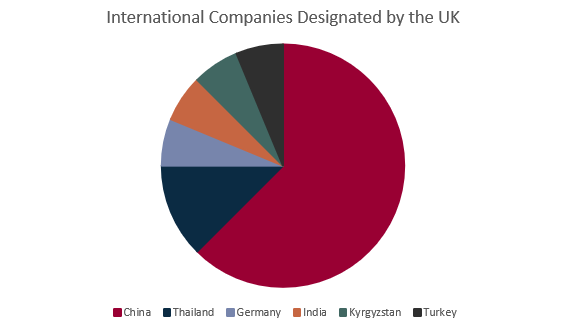Overview
The UK has announced its largest package of designations under the Russia (Sanctions) (EU Exit) Regulations 2019 (“Russia Regulations”) since 2022 to mark the third anniversary of Russia’s invasion of Ukraine. The action targets over 100 individuals, entities, and ships involved in Russia’s military supply chains, sectors of strategic or economic significance to the Government of Russia and its funding of the war, as well as government officials and those described by the Foreign, Commonwealth and Development Office (“FCDO”) as “propping up Russia’s kleptocratic system.” The measures are intended to underscore the UK’s continued commitment to, and support for, Ukraine as the conflict enters a crucial stage, as well as the importance of just and lasting peace in Ukraine to the collective security and prosperity of the European continent. In announcing the measures, Foreign Secretary Lammy acknowledged that dual purpose, stating that “[l]asting peace will only be achieved through strength. That is why we are focused on putting Ukraine in the strongest possible position.” In addition to its size, the package is notable for including the first use of recently expanded designation powers under the Russia Regulations that have secondary sanctions-like effects.
First Use of Secondary Sanctions-Like Designation Powers
The designation criteria under the Russia Regulations were expanded in July 2024 to allow the UK government to designate individuals and entities for providing financial services, or making available funds, economic resources, goods or technology to persons involved in destabilizing, undermining, or threatening the territorial integrity, sovereignty or independence of Ukraine and/or obtaining a benefit from or supporting the Government of Russia. The expansion was designed to prevent sanctions evasion and the diversion of sanctioned goods and technology to Russia via third countries that do not recognize the sanctions imposed on Russia by the UK and its international partners since Russia’s full-scale invasion of Ukraine in 2022.
The UK government’s designation of OJSC Keremet Bank (“Keremet”), a Kyrgyzstan-based bank, represents the first use of this new power. According to the designation notice published by HM Treasury’s Office of Financial Sanctions Implementation (“OFSI”), Keremet was designated for providing financial services to persons carrying on business in the Russian financial services sector and is now subject to asset freeze, making available, and trust services sanctions. UK credit and financial institutions are also prohibited from establishing or continuing correspondent banking relationships with Keremet, or processing payments in any currency to, from, or via Keremet following its designation.
Sectors Targeted by the Designations
Russian Military Supply Chains
The largest number of designations made by the UK involved individuals and entities linked to the Russian defence sector. These designations fell into several categories, as follows:
- four Russian state-owned entities and one individual involved in the production of armaments for the Russian military, scientific research with military applications, and the provision of special postal services for military-industrial goods and equipment;
- five Russian-based companies and three individuals involved in importing dual-use goods and acting as suppliers to the Russian military, including of machine tools, electronics, and semiconductor manufacturing equipment;
- six individual managers, directors and/or owners of German, Kazakh, Uzbek, Russian and Turkish companies for acting as enablers and suppliers to the Russian defence sector; and
- 16 companies from six countries for acting as enablers and suppliers to the Russian defence sector, as follows.

Sectors of Strategic Significance to the Government of Russia
The UK has designated seven companies and 17 individuals (including 14 “New Kleptocrats”) active in one or more sectors of strategic significance to the Government of Russia, including coal production (in Russia and non-government controlled Ukrainian territory), financial services, media and telecommunications, metals, oil production, and transportation.
Government Officials
The UK has designated five government officials from the Democratic People’s Republic of Korea (“DPRK”) for their involvement in supporting Russia’s military action against Ukraine, including DPRK Defence Minister, No Kwang Chol, three senior officers leading DPRK troops deployed to Russia, and a senior DPRK missile engineer deployed to Russia to support DPRK-Russia weapons development. Two Russian government officials also have been designated, Arsen Kanokov (a Senator representing the Kabardino-Balkar Republic) and Denis Popov (Deputy Minister of Civil Defence, Emergencies and Disaster Relief).
Ships Involved in the Transportation of Russian Oil
The UK measures have also focused on Russia’s energy revenues, specifying 40 oil tankers in the so-called Russian “shadow fleet,” which are involved in the transportation of Russian oil. According to the FCDO press release announcing the measure, these vessels have collectively carried Russian oil and oil products worth more than $5,000,000,000 in the last six months alone. This latest action against Russia’s shadow fleet brings the number of oil tankers sanctions by the UK to 133, the highest of any nation in Europe.




